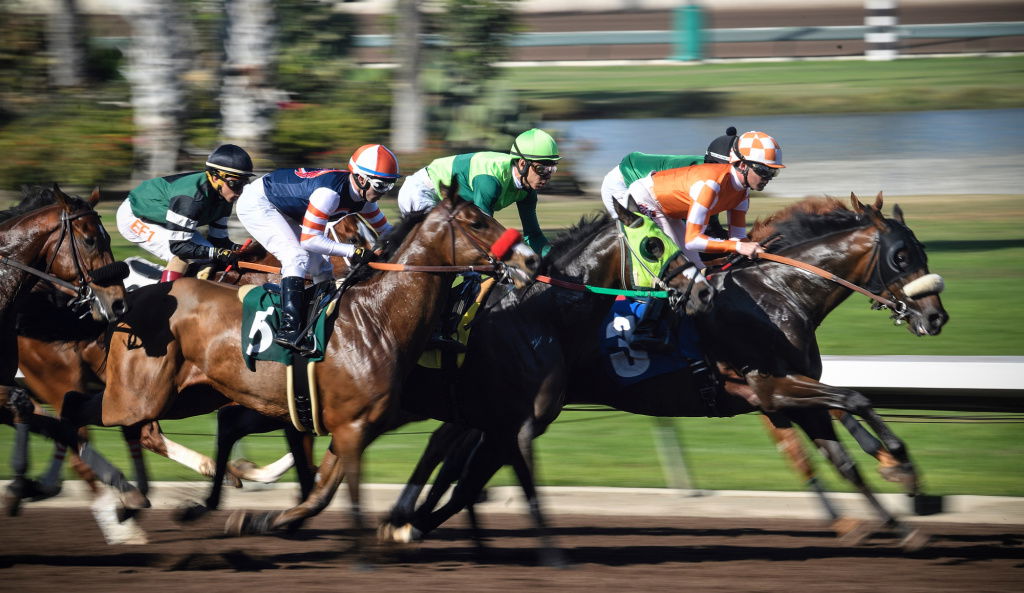

Equestrian sports in the Olympics include eventing, dressage and show jumping. Although these are truly coveted sports, they aren’t the most popular equestrian sport in the world. The most popular equestrian sport in the world is horse racing, but why isn’t it in the Olympics?
Watch What’s Trending Now!
History of equestrian at the Olympics

Reuters
The Olympic Rings monument seen outside the Japan Olympic Committee (JOC) headquarters near the National Stadium, the main stadium for the 2020 Tokyo Olympic Games postponed to 2021 due to the coronavirus disease (COVID-19) pandemic, in Tokyo, Japan June 23, 2021 on the day to mark one month until the opening of the Olympic Games. REUTERS/Issei Kato
In the early 1900s, the Olympics added eventing, dressage and show jumping into its ranks. Prior to that, the Olympics featured four completely different equestrian sports. These included polo, grand prix jumping (similar to today’s show jumping), high jump and long jump competitions.
ADVERTISEMENT
The IOC dropped equestrian from the Olympics in 1904, but they changed their decision peculiarly. In the 1912 Olympic Games in Sweden, the International Olympic Committee introduced dressage, eventing and show jumping into the fold. A century later, these sports continue to wow audiences across the world.
ADVERTISEMENT
ADVERTISEMENT
After its introduction, only uniformed officers took part in the equestrian sports at the Olympics. Therefore, names like Raimondo and Piero D’Inzeo, and the Swedish Army officers won tons of medals prior to 1952. After 1952, the Olympics accepted non-uniformed officers and regular athletes too.
Top Stories
Dan Campbell Confirms Final Stance on Jared Goff Trade, Announces if He’ll Fire Lions Coach

Amanda Balionis Confirms New Relationship Ending Months of Rumors

Ryan Day’s Two Major Calls Backfire as Ohio State Fans Demand Urgent Change

“Rest in Peace”: Condolences Pour In as Legendary Coach Freddie Roach Mourns Personal Loss

Mario Cristobal Makes “Cringe” Admission as Miami Legend Who Belittled OSU Loses It on the Sidelines

Brock Purdy’s Former Backup Breaks Down Plays That Prove He’s Worth His $55M 49ers Contract

Amidst this rich history, horse racing doesn’t appear at all. Chariot racing was a staple at the Olympics, but this took place in 684 BC. But why is horse racing, a sport that millions of people watch and generates a ton of revenue not a part of the Olympics?
ADVERTISEMENT
Why is horse racing black-balled?
ADVERTISEMENT
The major reason horse racing isn’t an Olympic sport is because it’s a betting-first sport. Betting on sports is a common feature, but betting in horse racing is a gigantic market. There are even conversations about whether horse racing is a legitimate sport or just a means for gambling.
The illegal betting market rakes in between $80 to $150 billion, while the legal market rakes in only a fraction of that amount. Another issue in horse racing in Olympics is who gets the medal- the athlete/rider of the owner of the horse. In the common equestrian sports in the Olympics, the medal goes to the athlete.
Finally, we come to the treatment of race horses. It’s common knowledge that exploiting an animal would land you in hot water, but the world of horse racing is more than just cruel to horses. Neither the FEI or the Olympic wouldn’t condone such activities, especially with their stringent anti-doping and animal protection laws.
ADVERTISEMENT
Read more: How Will Horses Be Transported to the Tokyo Olympics 2021 for Equestrian?
ADVERTISEMENT
ADVERTISEMENT
ADVERTISEMENT

